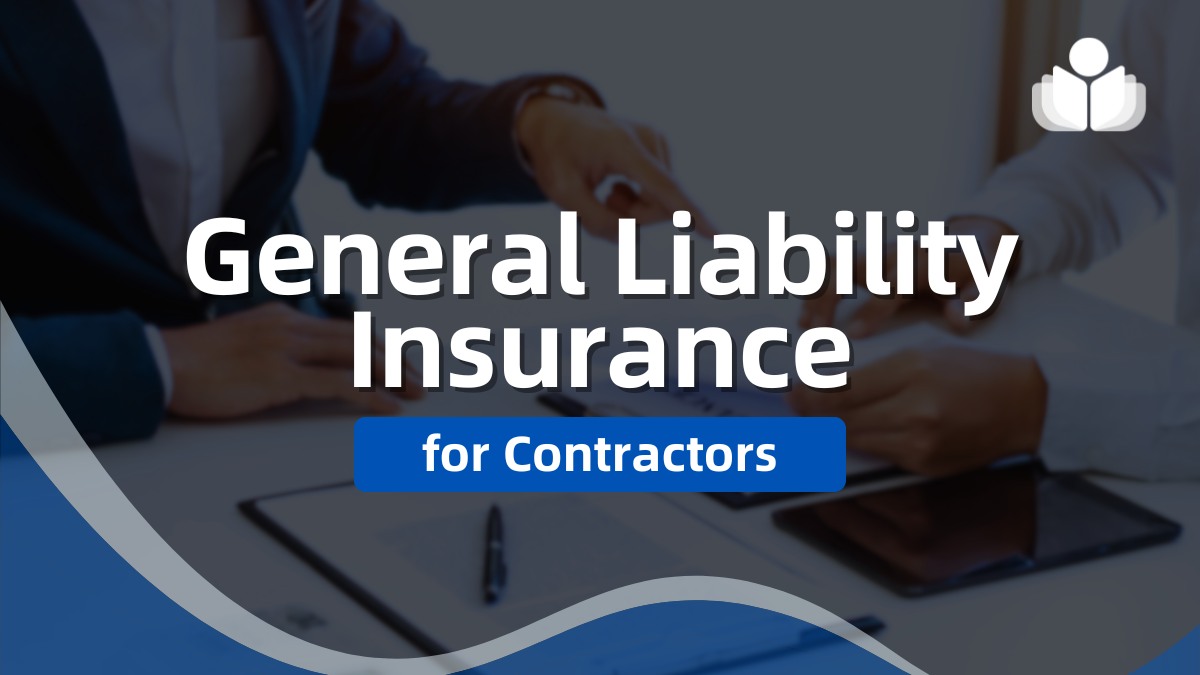General liability insurance for contractors and construction businesses protects your business from claims of bodily injury or property damage caused by your operations. Without this insurance, business owners must cover specific liability claims out of pocket.
Contractors face unique risks. Whether you’re meeting clients in a store or working on a client’s home, general liability insurance for contractors can provide essential protection.
>> Insure Your Business With NEXT >>
What Is Contractors Insurance?
Contractor insurance is a specialized small business insurance policy designed to address the unique risks associated with contracting work. A comprehensive contractor’s insurance policy includes various types of coverage to protect your business from accidents, lost income, lawsuits, and stolen, lost, or damaged tools.
For instance, if you accidentally damage someone’s home while on the job, the general liability portion of your contractor’s insurance can cover the cost of repairs.
How Much Does Contractors Insurance Cost?
Several factors influence the cost of your contractor insurance:
- Insurance coverage needs. The types and limits of coverage you choose will impact your insurance costs. Higher coverage amounts lead to higher premiums. Number of employees. More employees result in higher workers’ compensation insurance costs.
- Prior claims history. Your insurer will review your past business claims when determining costs.
Other pricing factors. Insurers also consider your business assets, property, location, and payroll size to estimate costs.
>> Ensure Your Business Future With NEXT >>
7 Ways to Save on Contractors Insurance
Here are some tips for finding affordable business insurance:
1. Compare business insurance quotes. Different insurers price policies differently, so compare quotes from multiple insurers to find the best rate.
2. Bundle up. A Business Owner’s Policy (BOP) bundles general liability, business interruption, and commercial property insurance, often at a lower cost than buying separately.
3. Implement a safety program. You may qualify for discounts if you implement and document a safety program.
4. Classify your workers correctly for workers comp. Accurate job descriptions and classifications can reduce workers’ compensation costs. Consult your insurance agent if you need help classify employees.
5. Join a trade or industry association. Membership in a large trade association can lead to group rate discounts on workers’ compensation insurance.
6. Pay your premium in full. Paying your premium in full rather than monthly may qualify you for a discount.
7. Increase your commercial car insurance deductible. Choosing a higher deductible for commercial car insurance can lower your premiums, as it reduces the amount your insurer pays if you file a claim.
Who Needs Contractors Insurance?
Contractors hired by clients to complete projects need insurance to protect against work-related accidents. Contractors can be divided into two types:
- Contractor. Also known as a general contractor, responsible for overseeing the project’s completion and fulfilling the contract. For example, managing the construction of a home addition.
- Subcontractor. A worker or company hired by the contractor to perform specific tasks or services, such as an electrician installing wiring in the new addition. Subcontractors typically report to the contractor, not the client.
Both general contractors and subcontractors need insurance to protect their businesses. Examples of contractors needing insurance include:
- Appliance technician
- Carpenters
- Concrete contractors
- Construction workers
- Drywall contractors
- Electricians
- Excavators
- Handyperson
- HVAC contractors
- Landscapers
- Painters
- Plumbers
- Masons
- Roofers
- Snow plowing
- Tile, stone, and flooring installers
- Tree Service
- Welders
What Does Contractor Insurance Cover?
A comprehensive contractor insurance policy includes various types of small business insurance to protect your business from many issues, such as claims, lawsuits, and damages to your business property. The specific coverage types you need depend on your contractor business’s unique requirements.
A good starting point is a Business Owner’s Policy (BOP), which bundles three essential coverage types and is typically more cost-effective than purchasing each separately. Here’s what a BOP includes:
Business Liability Insurance
The foundation of a small business insurance policy, it covers property damage and bodily injuries accidentally caused to others (excluding your employees). For example, if a branch from your tree service falls and damages a client’s roof, your general liability insurance can cover the repair costs.
Commercial Property Insurance
This covers damage to your business’s physical location and equipment due to a covered event, such as a tornado. It includes both leased and owned equipment, such as office furniture, tools, inventory, supplies, computers, business records, and valuable papers.
Business Interruption Insurance
If you need to temporarily close your business due to a covered event, like theft or fire, business interruption insurance replaces lost income. Also known as “business income insurance,” it covers issues such as wind damage, lost earnings, money lost due to damaged merchandise, and temporary relocation.
>> Insure Your Business With NEXT >>
What’s Not Covered by Contractors Insurance?
Contractors’ insurance has several exclusions, meaning it won’t cover certain types of problems. Common exclusions include:
- Floods (you need to buy a separate flood insurance policy)
- Earthquakes (you need to buy a separate earthquake insurance policy)
- Radioactive fallouts
- War
- Infectious diseases
- Government seizures
- Wrongful termination (unless you have employment practices liability insurance)
- Intentional and fraudulent acts
4 Best General Liability Insurance for Contractors
- Get a quote and buy a policy online in minutes
- Access and share your certificate of insurance online
- Offers some pricing information online, providing ballpark figures before you get a quote
- Doesn’t sell specialized coverage types like key person insurance or directors and officers insurance
NEXT’s general liability insurance premium offers unique, affordable solutions to damage claims quickly. Typically, the insurance adjuster evaluates the damages and decides within days of filing the complaint.
NEXT Insurance has an A- (Excellent) financial strength rating with AM Best and fewer complaints with the NAIC over the last three years than expected for its size. The company offers a live, easily shareable certificate of insurance, which can be updated 24/7 with additional insureds, a common need in the construction industry.The quote and application process is quick and easy and can be completed entirely online. Live chat support is available if you need help.
- Professional liability policies cover work done worldwide
- Industry-specific packages make it easy for business owners to identify the coverage they need
- Get a quote and purchase a general liability policy online
- Hiscox business owner’s policies aren’t available in all states
Hiscox is a top choice due to its competitive pricing and comprehensive coverage. Hiscox offers affordable premiums that fit within your budget, allowing you to allocate resources wisely while obtaining necessary coverage. Their general liability insurance policies cover bodily injury, property damage, and personal injury claims.
- Above-average customer satisfaction ratings for auto insurance shopping
- Free benefits like new car replacement are included with AARP auto insurance policies
- More complaints than expected for auto insurance policies
Hartford is a reputable business insurance provider, offering comprehensive coverage tailored to small to large businesses. Their user-friendly online portal allows policyholders to obtain quotes, make policy changes, request certificates of insurance, and track claims easily.
Hartford is ideal for larger small businesses due to its wide coverage options and available risk management services. The company offers a business owner’s policy that includes commercial property, general liability, and business income insurance, with customization options such as workers’ compensation and professional liability.
You can also get builder’s risk insurance from The Hartford. Their liability coverage is written as an occurrence policy, covering claims for incidents that occur while the policy is in effect, even if claims are made after the policy expires.
- Ranked 2nd in J.D. Power’s Small Commercial Insurance Study
- Fewer complaints than expected
- A++ (Superior) financial strength rating with AM Best
- Offers professional liability tailored to the construction industry
- Provides some policies on an occurrence basis
- Larger small businesses must work with an agent to get a quote
- Doesn’t offer discounts or price estimates
Chubb has the top financial strength grade from AM Best, showing a superior ability to pay claims. Chubb offers coverage tailored to the construction industry, including professional liability policies with pollution liability coverage and no exclusions for lead or asbestos.
Chubb also offers general liability insurance that can be purchased as occurrence-form coverage. Common coverages, such as workers’ compensation and builder’s risk insurance, are also available. However, some coverages aren’t available through Chubb’s small business portal, which offers online quotes for businesses with less than $2 million in annual revenue.
Frequently Asked Questions About General Liability Insurance for Contractors
>> Ensure Your Business Future With NEXT >>
Bottom Line
General liability insurance is essential for contractors, offering financial protection against many common construction and related activities risks. This insurance can safeguard against claims of property damage, bodily injury, and advertising injuries that might occur during your operations.
Whether you’re a solo contractor or run a larger construction firm, having this coverage secures your business assets and enhances your credibility with clients and stakeholders.
 Sections of this topic
Sections of this topic




















